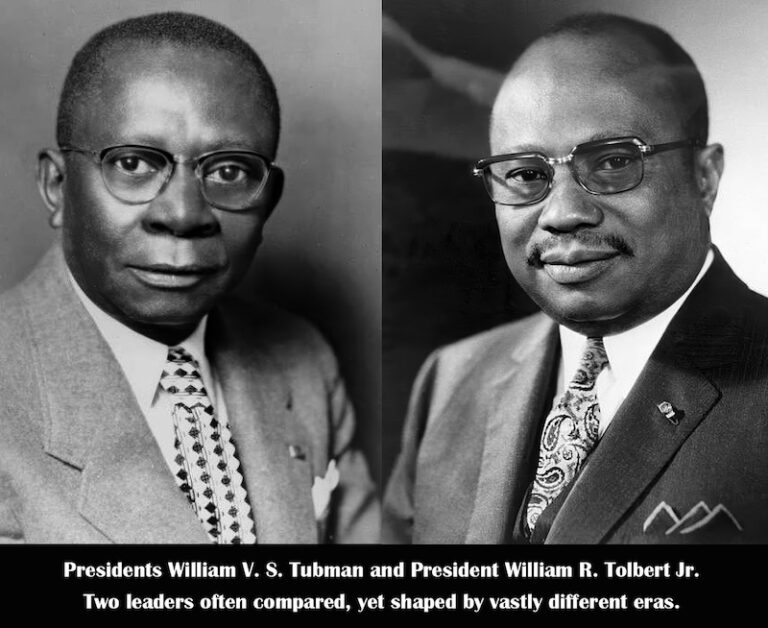
By Hun-Bu Tulay
Email: ntevoma@gmail.com
Cell#+231-777-111-032/886-517-356
WATER IS LIFE AND SANITATION IS DIGNITY
Monrovia, Liberia’s capital, teeters on the edge of a humanitarian catastrophe as more than 500,000 or more residents, who depend on the city public water supply have now endured two weeks without access to piped water. The crisis recalls a grim chapter from 1948, when waterborne diseases devastated the city, prompting the World Health Organization (WHO) to threaten a travel ban on flights to Liberia. Now, history threatens to repeat itself potentially with far deadlier consequences.
A City on the Edge: Lessons from History
In 1948, Monrovia faced a public health nightmare. Outbreaks of cholera, dysentery, and typhoid, fuelled by inadequate clean water and sanitation, threatened to spiral into catastrophe. While swift action by the World Health Organization (WHO) averted a disproportionate loss of life, the city’s infrastructure remained perilously weak. Today, decades later, Monrovia’s population has surged to over 1.5 million, yet its water and sewer systems still reliant on colonial-era pipelines are dangerously obsolete. The consequences of neglect are no longer hypothetical; they mirror the darkest chapters of history.
The above parallels to medieval Europe’s Black Death (1346–1350), which claimed half the continent’s population through sanitation failures and contaminated water, are stark. Monrovia’s current crisis carries similar existential stakes. In 1992 during Liberia’s civil war, we documented this fragility in an article titled “Monrovia Sitting on a Time Bomb.” The piece was penned amid the NPFL’s “Octopus” offensive, when rebel forces seized the White Plains water treatment plant, cutting off supply to the capital. Residents resorted to drinking from polluted wells and stagnant pools, triggering deadly disease outbreaks. After reading the article, acted immediately, even though some of advisers told him that the written was NPFL support. Thank God, Engineer Reginald Sherman, who read the article and thought otherwise.
In response to escalating violence and the strategic importance of the Water Plains region during Liberia’s civil war, Interim President Dr. Amos C. Sawyer took decisive action in the early 1992. Recognizing that control of the Water Plains a critical hub for water resources was vital to preventing humanitarian catastrophe, Sawyer appealed urgent assistance. Specifically, he called upon the ECOWAS Monitoring Group (“ECOMOG”), the regional peacekeeping force, to mobilize troops and recapture the area from rebel factions.
The intervention proved pivotal. ECOMOG forces launched a coordinated military campaign, leveraging regional cooperation and international support to secure the Water Plains. Their success not only stabilized access to clean water and food supplies for thousands of displaced civilians but also disrupted rebel efforts to weaponize the region’s resources. Historians and survivors alike credit this operation with averting mass starvation, disease outbreaks, and further bloodshed. Had ECOMOG failed, the Monrovia and its surrounding would have become a graveyard. Their victory gave us a thread of hope in 1992. The question is, what will the President Boakai’s Government do? Sit and wait or appeal for assistance as Dr. Sawyer did. Currently the LWSC does not have the capacity to speedy underwrite the cost of the repair.
Dr. Sawyer’s leadership during that crisis underscored his commitment to stabilizing Liberia amid its descent into chaos. Though his interim administration faced immense challenges, the recapture of the Water Plains stood out as a rare moment of progress, showcasing the potential of regional peacekeeping efforts like ECOMOG. The operation also highlighted the interconnectedness of security and humanitarian needs in conflict zones a lesson that resonates in peacebuilding efforts to this day. Those who remember history can quickly find solutions to difficult problems. This water crisis should have lasted even a complete week.
Three decades later, little has changed. In 2023, I authored “The Silent Killer,” detailing another collapse: the failure of a critical 36-inch transmission pipe, again halting water access for millions. These pipelines, installed over a half century ago, have far outlived their lifespan. The warnings in both articles were unequivocal: without urgent modernization, Monrovia’s crumbling infrastructure would catalyse a public health disaster.
Yet, inertia persists. Each crisis whether born of conflict or decay exposes the same vulnerabilities. The 1992 shutdown and the 2023 pipe rupture are not isolated incidents but symptoms of systemic abandonment. Cholera, typhoid, and dysentery linger at the margins, waiting to explode.
History offers a grim lesson: societies that ignore their infrastructural foundations do so at their peril. Monrovia’s repeated brushes with catastrophe are not mere misfortune hey are the result of choices. The time to act is not when the bomb detonates, but before the fuse is lit. If the past is prologue, the city’s next crisis may eclipse even the darkest predictions.
A Preventable Disaster: Broken Promises and Missed Opportunities
In 2016, the Liberia Water and Sewer Corporation (LWSC) launched an ambitious plan to modernize Monrovia’s crumbling water and sanitation infrastructure, backed by government and international donor support. The initiative aimed to address systemic vulnerabilities, but funding shortfalls, contractor disputes, and political instability ultimately derailed progress with devastating consequences.
Key Projects and Challenges
- Pipeline Replacement:
The centrepiece was replacing a deteriorating 36-inch concrete pipeline, built in 1966 and serving 75% of Monrovia’s population, with a modern 48-inch ductile iron system stretching from White Plains to Palm Spring (25 kilometres). Priced at $28 million, the project promised to meet water demand until 2060. However, the World Bank secured only $20 million (US15 Million for works. Compounding the shortfall, the contractor after winning the bid for 15 kilometres of pipelaying, which could cover critical sections of the work up to Redlight (21 kilometres) persuaded LWSC’s former management to reduce the scope from 15 km. She later proposed that the scope be reduced to 12 km, halting work at 15 kilometres short of Redlight Redlight instead of completing the full roue.
- Sewer System Rehabilitation:
A $37 million plan aimed to overhaul Monrovia’s sewage infrastructure, including rehabilitating the Fiamah Treatment Plant, repairing collection networks and lift stations, and constructing new systems in Paynesville and Gardnerville. By late 2017, the World Bank had allocated $20 million, with a task manager noting $20 million was secured to start the Fiamah rehabilitation. However, funding for Paynesville and Gardnerville remained unresolved. Unfortunately, the past LWSC Management /government did not follow up. And Monrovia sanitary condition remains as those of Medieval’ s Europe. Many people in Liberia do not read, this was highlighted in the TUERN OVER NOTE in January 2018.
Leadership Shifts and Systemic Collapse
By 2018, both projects were stalled. A change in LWSC leadership and shifting political priorities diverted attention from critical follow-through. The consequences erupted catastrophically in 2023 when the aging 36-inch pipeline already operating decades beyond its lifespan collapsed entirely. Hospitals, schools, and households across Monrovia now face severe water shortages, exacerbating public health risks and urban instability.
A Lesson in Fragility
The crisis underscores the peril of underfunding essential infrastructure and the cascading effects of bureaucratic delays. With the pipeline project still $8 million short and sewer rehabilitation incomplete, Liberia’s water security hangs in the balance, demanding urgent international intervention and accountable governance.
A Legacy of Corruption and Political Greed
Monrovia’s water crisis is not an accident of nature, but a man-made disaster fuelled by systemic corruption, political meddling, and the shameless prioritization of personal gain over public welfare. For decades, Liberia’s leaders have treated critical infrastructure projects as opportunities for kickbacks, embezzlement, and patronage, leaving citizens to suffer the deadly consequences of their greed.
A Cycle of Sabotage: Contracts as Cash Cows
The Liberia Water and Sewer Corporation (LWSC) has long been a battleground for political interference. In 2017, when LWSC leadership rightfully terminated an underperforming contractor tasked with rehabilitating the White Plains Water Treatment Plant, it was a rare act of accountability. A new contractor completed the repair’s works proving progress was possible. Yet today, history repeats itself: the 48” pipeline project, awarded in 2023, is paralysed by deliberate delays orchestrated by a contractor enabled by complicit officials. Why? Because terminating the contract would expose the web of financial interests binding politicians to these projects.
Bank funds for the pipeline are set to expire by December 2025. If delays persist, the government will be forced to scramble for alternative funding, inevitably diverting resources from other essential services. But this is no oversight it is a calculated strategy. Politicians, including officials within the Ministry of State, are actively blocking LWSC’s autonomy to protect their cut of the deal. Their playbook is familiar: during the previous administration, similar interference delayed the RIA Highway project, culminating in sanctions against corrupt officials. Yet the lesson remains unlearned.
The Collapse of Progress: How Greed Drowned three of Seven Systems
When LWSC’s management transitioned in January 2018, they handed over seven fully functional water systems operating at pre-war capacity, including Monrovia, Buchanan, Kakata, Sanniquelle, Voinjama, Roberstsport, and Zwedru. By 2022, three systems had collapsed due to gross negligence and the diversion of maintenance funds a direct result of leadership more interested in embezzling resources than sustaining infrastructure. The current LWSC management struggles to revive these systems, not due to incompetence, but because political appointees prioritize loyalty to patrons over technical expertise.
Human Catastrophe: Profiting from Thirst
The human toll is a damning indictment of Liberia’s ruling class. Families drink from faces-contaminated wells and stagnant ponds, while clinics overflow with cases of cholera, dysentery, and deadly skin infections. Street vendors and laundries cornerstones of the informal economy face ruin. No water means no income for some residents in the water business. Yet officials responsible for this suffering dine on stolen funds, trading lives for luxury.
A Culture of Impunity: Short-Term Gains, Long-Term Ruin
Corruption is institutionalized. Ministry of State officials routinely sabotage LWSC’s efforts, favouring contractors who offer bribes over those who deliver results. Projects are designed to fail, ensuring a perpetual cycle of “emergency” contracts and donor funds ripe for plunder. For Liberia’s elites, water scarcity is a business model.
A Path to Accountability: Demanding Courage Over Complicity
To break this cycle, Liberia must confront its rot head-on:
- End Political Interference: President Boakai must immediately halt the Ministry of State’s sabotage of LWSC. Appoint independent technical experts not party loyalists to oversee projects.
- Prosecute Corruption: Launch a judicial inquiry into the 48” pipeline delays and the collapse of Buchanan, Kakata, and Zwedru systems. Name and shame officials who are responsible.
- Recommendation for LWSC Board Restructuring and Contract Transparency
To enhance governance and service reliability, the President should urgently restructure the LWSC Board by replacing politically appointed members with qualified professionals and stakeholders. The reconstituted board should include:
Technical experts (e.g., engineers, hydrologists) to ensure evidence-based decision-making on infrastructure and resource management.
Civil society advocates to uphold accountability and represent community interests, particularly marginalized groups.
Consumer representatives, such as businesses like Club Brewery, whose operations depend on consistent water supply. Including such stakeholders incentivizes decisions that prioritize service continuity and quality.
It might even better if the president consider appointing a donor on the board of LWSC and LEC since the donors contribute 75% of the activities of these agencies.
Simultaneously, transparency in contracting processes must be prioritized. Competitive bidding, public disclosure of contracts, and independent oversight would curb corruption, reduce costs, and build public trust. This model, successfully adopted in many countries, ensures that board decisions align with public welfare rather than political or private interests.
By cantering expertise, accountability, and consumer needs, LWSC can transform into a utility that reliably serves both citizens and the economy.
- Emergency International Aid: Partner with donors willing to bypass corrupt intermediaries, channelling funds directly to vetted contractors under independent oversight.
- The Members of the Legislative must exercise its oversight responsibility over three LWSC by inviting the LWSC Management, the Members of the Project Implementation Unit (PIU) to brief them on the water situation in Monrovia and the other three county’s capitals (Buchanan, Kakata and Zwedru). They should tell the legislators why the original contact scope was reduced from 15 kilometres to 12 kilometres.
A Moral Reckoning
This is more than a crisis of infrastructure it is a betrayal of humanity. Liberia’s leaders have weaponized incompetence, turning water into a commodity only the connected can afford. The ghosts of crises past from the cholera outbreaks of the 1940s to the RIA Highway scandal haunt a nation held hostage by greed.
President Boakai faces a choice: become another footnote in Liberia’s history of kleptocracy or dismantle the systems that allow officials to profit from thirst. Clean water is a right, not a privilege. Until Liberia’s leaders internalize this truth, the blood of those lost to preventable disease will stain their hands.
Urgent Call for Immediate Action: Secure Emergency Funding to Prevent Catastrophic Infrastructure Collapse
The government must act without delay to mobilize emergency funding for the Liberia Water and Sewer Corporation (LWSC) to expedite critical repairs to the failing 36” pipeline, which is teetering on the brink of total collapse. With the completion of the 48” pipeline still months away, we face a looming humanitarian and economic crisis if the 36” infrastructure suffers additional ruptures a scenario that is not only likely but imminent. Time is not a luxury we possess, every hour of inaction risks devastating water supply disruptions, exacerbating public health vulnerabilities, and crippling essential services for thousands of citizens.
To avert this disaster, we urgently propose the establishment of a dedicated Emergency Repair Fund a financial safeguard designed exclusively to address immediate pipeline failures and pre-empt systemic breakdowns. This fund must be prioritized as a national imperative, resourced through swift collaboration between the government, international donors, and development partners.
The Minister of Finance and Development Planning must spearhead this effort without hesitation. We demand an emergency high-level meeting within the next 48 hours to rally donor support, secure pledges, and outline a transparent mechanism for rapid fund disbursement. Key stakeholders, including the World Bank, African Development Bank, European Union, United Nations Development Program (UNDP), and bilateral partners, should be convened to emphasize the gravity of this crisis and their pivotal role in mitigating it.
The consequences of delay are unthinkable: prolonged water shortages, heightened risk of waterborne diseases, and irreversible damage to public trust in critical infrastructure. This is not merely a repair it is a rescue mission. The government must demonstrate leadership by:
- Immediately allocating contingency funds to LWSC to accelerate ongoing repairs.
- Establishing the Emergency Repair Fund by the end of this week**, with clear oversight protocols.
- Launching a public awareness campaign** to communicate steps being taken, reducing panic and fostering community cooperation.
Liberia’s stability and the well-being of its people hang in the balance. We cannot afford to wait for the next rupture to act* The moment for decisive, uncompromising action is NOW.
Below: Photos of the 2016 of the 36” pipeline failure and temporary repairs a stark reminder of the system’s fragility.














